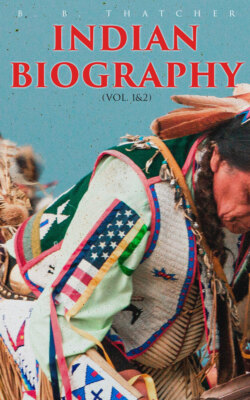Читать книгу Indian Biography (Vol. 1&2) - B. B. Thatcher - Страница 17
На сайте Литреса книга снята с продажи.
Footnote
Оглавление[1] Not to subject ourselves to the charge of plagiarism, it may be proper to remark here, that several passages in the following notices of the Pokanoket Sachems have been taken almost unaltered from an article on Indian Biography, published heretofore in the North American Review, and written by the author of this work. The same is true of a part of the subsequent notice of Tecumseh and his brother.
[2] This celebrated eminence (frequently called, by corruption of the Indian name, Mount-Hope) is a mile or two east of the village of Bristol. It is very steep on all sides, and terminates in a large rock, having the appearance to a distant spectator, of an immense dome.
[3] It is gratifying to learn from Smith that Hunt was punished, though not according to the baseness of his infamous crime. "He betraied foure and twentie of these poore Saluages aboord his ship, and most dishonestly and inhumanely for their kinde usage of me and all our men, carried them with him to Maligo, and there for a little priuate gaine sold those silly Saluages for Rials of eight; but this vilde act kept him ever after from any more imploiement to these parts."—Generale Historie of New England, published in 1632.
[4] We have given the most simple orthography of this word. It is frequently written Massasoyt, Massasoiet, Massasowat, &c. Mr. Belknap says, (American Biography,) that contemporary pronunciation made it a word of four syllables, with the accent on the second—Mas-sass-o-it. The sachem subsequently assumed another name, which has undergone still more various modifications—Oosamequin, Woosamequin, and Ausamequin, are some of them.
[5] A stone arch has in modern times been thrown over this brook, to point out the precise spot of the meeting. The hill where the chieftain first appeared was by the settlers of his time called "Strawberry-Hill."
[6] So minutely is the transaction described in The Journal of a Plantation at Plymouth, preserved by Purchas, and re-published among the Historical Collections of Massachusetts. There is reason to think that Winslow was the author.
[7] "He marvelled much at our trumpet, and some of his men would sound it as well as we could."—Journal.
[8] From whom the outer point of Boston harbor is said to have been named.
[9] Such was the earliest visit, of ceremony or business at least, which the natives of New England paid to the Colonists. The account given of it, though ex parte, as all such descriptions must be, is honorable to the former in the highest degree. They show that many, if not most of the savages, who were fairly dealt with, were at first as sensible and as prone to kindness as could have been wished. They went unarmed among the settlers without fear, disposed to be honest and friendly at all events, and as hospitable as their means permitted. It will appear in the sequel, that they continued so for a long course of years, as they also continued faithful to their express obligations.
[10] See Mourt's Relation, part of which is also preserved in the Collections. The name of the publisher only seems to be attached to it.
[11] Called maxium, and made of Indian corn, no doubt. Gookin says, that a meal which they made of parched maize was so sweet, so hearty, and so toothsome, that an Indian would travel many days with no other food.
[12] Which, it may be here observed, was quite considerable. Squanto was ambitious and meddlesome, though not malicious—well-disposed and serviceable to the English, but a little too anxious to have credit for that fact among his countrymen. He amused himself with telling them that the whites kept the plague barreled up in their cellars, that they intended war upon various tribes, &c. for the sake of being employed, sometimes hired, to act as mediator; and of course he always succeeded in settling the difficulty. Squanto died in November, 1622, on an expedition fitted out by Governor Bradford for obtaining corn among the Indians. His last request was, that the governor would pray for him that he might go to the Englishman's God in Heaven. He bequeathed, his little property to his English friends. So perished the last aboriginal of the Plymouth soil. He sometimes played "Jack upon both sides," as Hubbard says, but his death was justly considered a public loss.
[13] Probably an Indian Powah was leader of the chorus. Of these barbarian quacks, Roger Williams says, that "the poore people commonly dye under their hands," for the very good reason that they "administer nothing, but howle, and roar, and hollow over them, and begin the song to the rest of the people about them, who all joyne (like a quire) in prayer to the gods for them." Key to the Indian Language, chapter xxxi.
[14] The date of this Indian's death is not known. He is said to have once been a war-captain among the Massachusetts tribes. Hubbard describes him as a "proper lusty young man, and of good account among the Indians of those parts for his valor." He was useful, like Squanto, without being troublesome.
[15] In that rare tract (published in London, 1651.) entitled "The Light appearing more and more towards the perfect Day" &c. and written by the Rev. Thomas Mayhew, it is stated, that some of the Christian Indians of Martha's Vineyard had a conversation with "Vzzamequin a great Sachem or Governor on the maine Land (coming amongst them) about the wayes of God"—he enquiring what earthly good things came along with them, and what they had gained by their piety, &c. This was previous to 1650.
